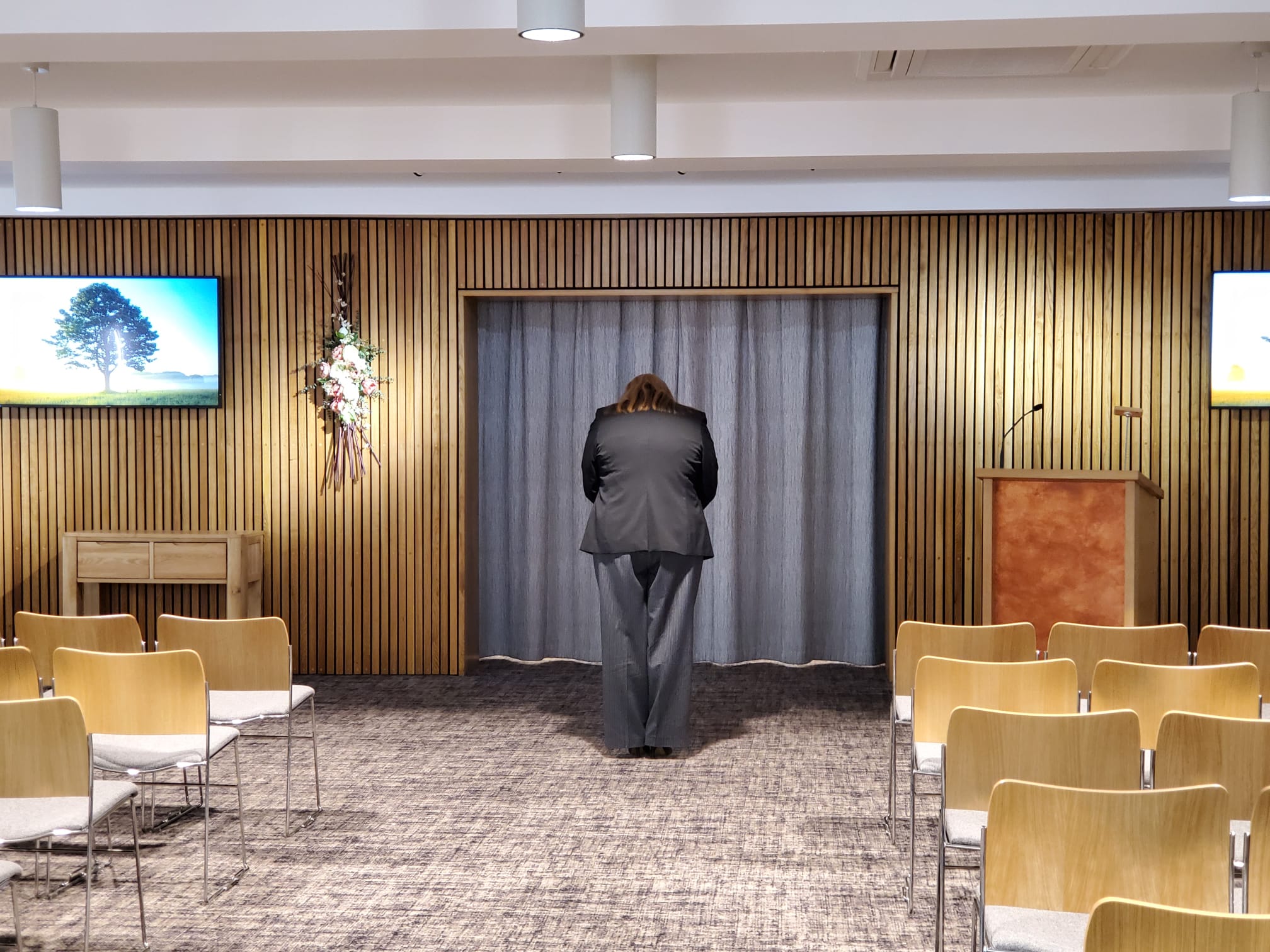Sometimes, a funeral might be delayed. For example, if there are any complications with the death, any trouble with the paperwork, or any availability issues with the funeral provider. But generally, funerals usually occur within one to three weeks after a death, allowing the family enough time to make arrangements.
In some cases, families might choose to hold the funeral sooner. Religious funerals often follow this practice, for instance, both Jewish and Islamic funerals usually occur within 24 hours of death.
In the UK, Mondays or Fridays are usually preferred by families as being near the weekend they work best for the attendees' schedule.
However, there are no days that are more popular than others. Some funeral providers offer weekend services, but the availability is usually limited. Therefore, a funeral often takes place on a weekday in the morning or in the afternoon.
Ultimately, the most suitable day for a funeral will depend on factors such as the availability of the venue, religious customs, family members, and the desired timeframe for the funeral service.
When planning a funeral, it’s important to think about the following:
Consider a direct cremation if you need some flexibility. Direct cremation allows you to hold a funeral service separately from the cremation. This means you can plan a memorial service at a time that suits everyone, without the pressure of aligning it with the immediate cremation. This can be especially helpful for accommodating travel plans, venue availability, and ensuring that all legal and administrative requirements are met.
Yes, you can delay a funeral. Sometimes, we’re just not ready to take that step until a little while after the death has occurred, whereas other times we may not feel the time is right for our family and friends to be able to pay their respects.
If you wish to delay the funeral of a loved one, you can arrange with the funeral provider or funeral director to provide specialised care for the deceased until the delayed funeral date.
There are several reasons why a funeral might be delayed and they're not always reasons forced upon us. A funeral can be delayed an indefinite amount of time, though the deceased should be in their final resting place within six weeks.
Family considerations or personal circumstances
The death of a loved one affects us all differently. For some people, it may be a case that they're unable to face the funeral so soon after the death of their loved one and choose to delay the service until a later date. For others, the deceased may have a large circle of friends and family who wish to attend their funeral but are unable to do so within the short time frame typically associated with holding a funeral.
Legal procedures or coroner investigations
Following a death there are legal requirements and funeral documents that need to be completed before the funeral can take place, and if these haven't been completed then a funeral may be delayed. In some cases, if the death is unclear or suspicious, a coroner may become involved to establish a reason for the death which could delay the funeral.
Organisational challenges
Funeral arrangements often involve coordinating with various parties. For example, the deceased may need to be transported over a long distance to the crematorium or there might be a delay in finding an available venue for the funeral service. This is usually down to the funeral provider to coordinate, but it isn't out of the ordinary for a funeral to be delayed for this reason.
Religious or cultural considerations
While many religions tend to favour having a funeral as soon as possible, there are some religions and cultures which have different rituals or waiting periods, which may require a funeral to be delayed longer than usual.
Worldwide circumstances
In certain cases, extreme weather conditions, such as heavy snow or floods can disrupt transportation or make it unsafe to hold a funeral service. Public health emergencies, such as in the case of the COVID-19 pandemic, could also lead to delays.

With a direct cremation, you can hold a delayed funeral without having to worry about what will happen to your loved one in the time between. A direct cremation lets you separate the act of cremation from the memorial service by providing a respectful unattended funeral shortly after the death has occurred:
Not only are our low cost funerals carried out with love and care, but we also offer one of the UK’s best value services.
From your very first phone call, right through to the hand-delivery or scattering of the ashes, you can rest assured that you will be in the most caring and attentive hands with Distinct Cremations.
Our caring team are here 24/7 to support you through the most difficult of times
Rhiannon Pearson
Team Leader

A funeral can be arranged at different times, depending on individual preferences and circumstances.
While many people wait until after a loved one has passed away, others prefer to make arrangements in advance when their loved one is receiving end-of-life care. Additionally, pre-planning a funeral by taking out a funeral plan is also an option.
Below, we explore these options in more detail.

If a loved one is receiving end of life care, you can call a funeral provider to let them know the situation. From there, they will begin getting the foundations in place and will be able to guide you through the next steps to help make things as easy and stress free as possible for when the time comes. By arranging in advance, you can focus on spending quality time with your loved one without the added stress of making last-minute arrangements.
Call our team for free
If a loved one has died, you should call a funeral provider to let them know. The funeral provider will then take care of the arrangements and coordinate things with you and your family by arranging the collection of a loved one and organising the funeral with the venue.
Arrange a funeral today
A funeral plan gives you peace of mind knowing costs are covered when the time comes, allowing you to get your funeral plans in place in advance and protecting you from the rising costs of funerals. Funeral plans can be purchased on behalf of someone else or for yourself.
Explore our funeral plansWhen a loved one passes away, they are typically taken into care within a few hours to a day, whether they are at home, in a care home, or in a hospital.
Collection is usually arranged within a few hours using a private ambulance. At Distinct Cremations, families are informed with a call 30 minutes before arrival. The funeral provider will coordinate with the facility to determine a suitable collection time.
Funeral providers often have multiple operations teams and a fleet of funeral ambulances on standby 24/7 to ensure timely collection. Once collected, the deceased is transported to our mortuary facility with dignity and care to prepare them for cremation.
Learn more about how a direct cremation works.
Each religion has their own custom when it comes to a funeral. A number of religions typically hold a funeral within 24 hours of a death, whereas others prefer to hold the funeral within a week.
Funerals within most Christian denominations are held within a few days. Catholic funerals are held within 3 days of death, though this may change due to scheduling arrangements.
Islamic funerals take place as soon as possible after death, often within 24 hours. Traditional Islamic funerals also do not include viewings, embalming or a coffin.
Hindu funerals typically occur within 24 hours of the death. However there can be variations depending on regional customs and availability. The casket is typically open at a Hindu funeral.
Jewish funerals typically take place within 24 hours of death, unless the day of the funeral falls on the Sabbath or a religious holiday. A Jewish funeral is often conducted swiftly.
A Buddhist funeral usually takes place within a week, allowing family and friends to gather and offer prayers, sutras, chants and respect for the deceased.
A Sikh funeral will often take place within a week, allowing time for family and friends to gather together, though this is subject to change depending on local customs.
Below are a few further articles that you may be interested in.

There are a number of documents that need to be completed before a funeral can take place including three different cremation forms. Our article details which forms you need to complete and how our team can help.
Funeral documents
Alternatives to a traditional funeral have become much more popular in recent years. In this article we outline the different options available and why people are opting for something a little bit different.
Alternatives to a traditional funeralWe offer the highest level of support, but don't just take our word for it. Below are recent reviews from customers who bought a funeral with us.





